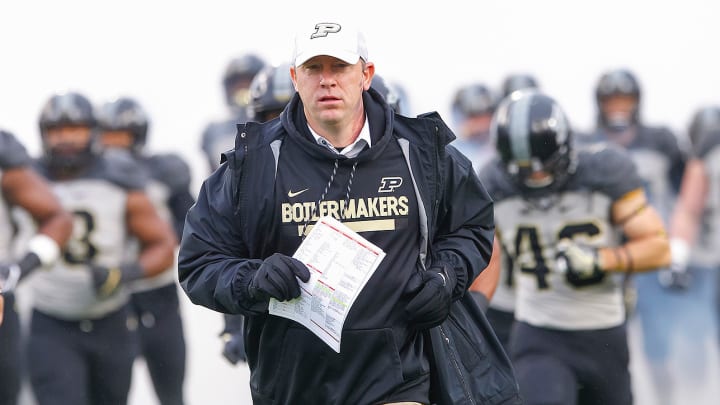Purdue Hopes to Build on Its Turnaround Season in Year Two Under Jeff Brohm

Week 1 of the college football season kicks off Thursday night, with a slate of 12 games that features just one ranked team: No. 21 UCF vs. UConn at 7 p.m. ET. But an hour after that American Athletic Conference start, one of the most fun turnaround teams of 2017 will commence its 2018 season, and as Purdue enters the second year of coach Jeff Brohm’s tenure, it’s hoping to build a strong start into something more sustainable.
The Boilermakers fired their previous coach, Darrell Hazell, in 2016 in the middle of an eventual 3–9 campaign. At that point, Purdue hadn’t finished with a winning record since 2011, when Danny Hope’s team went 7–6 and won the Little Caesar’s Pizza Bowl. The 2010s were shaping up to be a lost decade of football in West Lafayette—until Purdue brought in Brohm, a former college, NFL and XFL quarterback who’d been the head coach at Western Kentucky since 2014.
The Purdue gig was Brohm’s first Power 5 head-coaching job, but in three seasons with the Hilltoppers, he’d averaged 10 victories, won Conference USA in 2015 and tied for first place in the conference in 2016. Known for his offensive mind after years playing and coaching quarterbacks, Brohm looked poised to up the Boilermakers’ scoring and production—and in his first year at Purdue, he turned a three-win team into a 7–6 squad.
Going into 2018, Brohm brings back both quarterbacks who started for him in 2017; fifth-year senior David Blough injured his leg in November and missed the rest of the season, and his replacement, junior Elijah Sindelar, tore his ACL in relief duty but played through the injury. Both have recovered from their injuries and should be ready to go Thursday night, but Purdue is remaining mum on who will get the nod at home against Northwestern. The final word won’t come until game day, but no matter who wins the job, expect to see both players in some fashion this fall; even when the job was Blough’s early last season, Sindelar appeared frequently, and for much of the middle of the year, the two split time under center.
“I know for us, luckily and fortunately, we had an injury to David Blough middle to late (part) of the year, and when Elijah (Sindelar) came back in, he’d already played quite a lot in meaningful snaps, and he was ready to go,” Brohm told SI.com during fall camp. “He played better than he had ever played all year long, and I think it was because he had had that experience earlier in the season.”
Brohm preaches competition at the quarterback position. He played for coach Howard Schnellenberger at Louisville from 1989–93, and he says he learned that philosophy from the longtime coach, who brought his backup in to games for one second-quarter series. “At the other positions, you’re always trying to push others to perform,” Brohm said. “You’re playing more than one guy, and normally it brings out the best in your guys—and at the quarterback position, we’re not going to be scared to do the same thing.”
The Blessing and the Curse of Being Lane Kiffin
As part of his offensive philosophy in four years as a head coach, Brohm has been known to champion trick plays, which he says can turn the tide of a game in favor of his team, and that was no exception in 2017. But he qualifies praise of those outside-the-box decisions with the reminder that at times a year ago, they succeeded when his team’s offense wasn’t working by conventional definitions. In fact, it wasn’t offense that defined the Boilermakers' 2017 season. They finished having averaged 25.2 points per game, 92nd overall in the FBS, while allowing opponents 20.5 points per game—which was good for No. 24 overall.
Purdue’s defense allowed only two opponents—Louisville and Arizona—more than 30 points. That unit lost seven starters this offseason, and it’ll be a tall task to replace them—which means Brohm’s offense may have to do more to carry this team. Still, Brohm said he doesn’t expect his defense to fall off too much, just as he doesn’t think Purdue’s offense will be appreciably better. Instead, he looks at the Boilermakers’ final stretch of 2017, when they won their last three games by an average score of 31–25. “Hopefully,” Brohm said, “we can start where we finished.”
A win against Northwestern, which Purdue hasn’t beaten since 2010, would go a long way toward setting the tone for the coach’s second season. And if the Boilermakers can pull off another winning record this fall, it’ll be the first time they’ve been above. 500 in two consecutive seasons since 2007.

Staff writer Joan Niesen returned to SI in 2014 after first coming to SI as an intern while in graduate school. She covers college football and the NFL.